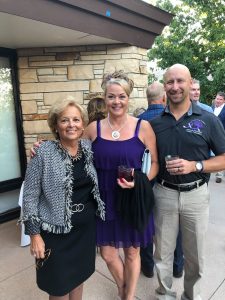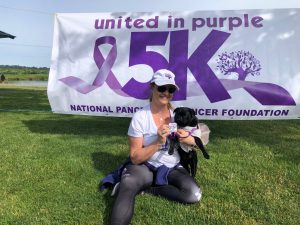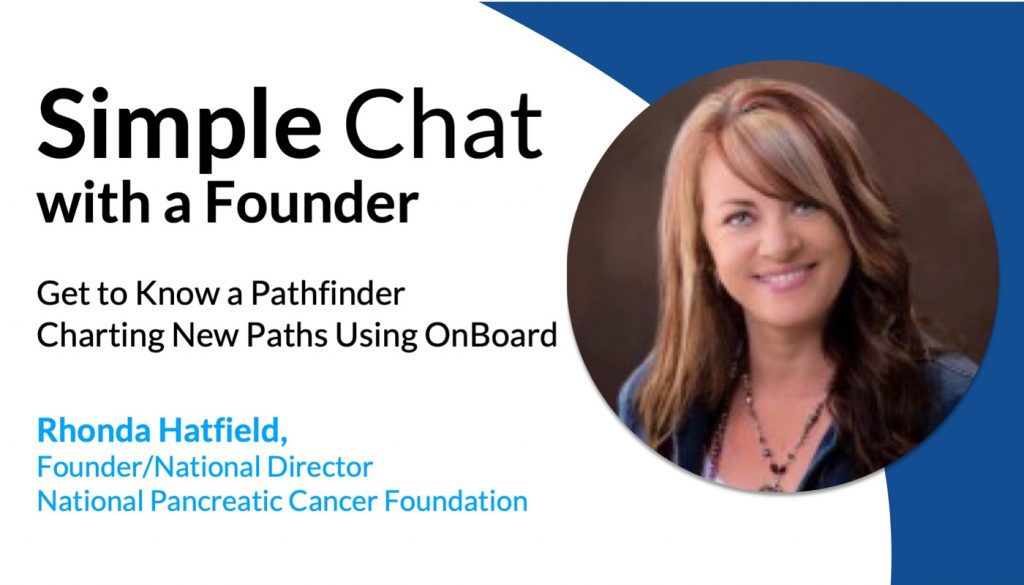About the “Simple Chat” series
By definition, a Pathfinder is “one that discovers a way, especially one that explores untraversed regions to mark out a new route.” At Passageways, every employee is called a Pathfinder. So, too, are our customers.
In this new content series, we’ve asked some amazing OnBoard customers to sit down for a simple chat. The names and places may differ, but they all have one thing in common: they are all charting new pathways forward for their organizations.
We are proud to highlight Rhonda Hatfield, the Rhonda Hatfield, Founder/National Director of the National Pancreatic Cancer Foundation.
Getting to Know Your Work
1. November has been National Pancreatic Cancer Awareness Month. What’s the biggest misconception that people have about pancreatic cancer?
The biggest misconception is that people don’t even know that it exists as a form of cancer. That’s why it’s so important that we bring more awareness. Many people reach out to us and say they didn’t know that pancreatic cancer was even a cancer. And that’s after their diagnosis. So we really want to bring awareness to people that there’s a better chance of surviving it if you get it detected earlier.
Show us your #Purple! #WPCD #DemandBetter #Hope4PC #NPCF pic.twitter.com/gBj4tIktIJ
— NPCF (@NationalPCF) November 21, 2019
2. Complete this sentence: “The NPCF is amazing because ______.”
The NPCF is amazing because we offer direct financial assistance for patients while they’re in treatment. That’s to keep a roof over their head, food on the table, and allow them to focus on their health instead of worrying about how they will pay their rent or mortgage for that month.
3. Complete this sentence: “The NPCF’s Board of Directors is amazing because ____.”
The NPCF’s Board of Directors is amazing because they’re a unique group of individuals who will do anything to support the mission and passion behind what NPCF does every day for those patients with pancreatic cancer.
Getting to Know How You Work with Your Board
4. What are 3 traits that successful Board members demonstrate?
I think that the successful board member would have the passion for the cause, the ability to see outside the box when it comes to different ways to approach the issue, and persistence in getting information out there.
5. What is one thing a Board can do immediately to become more effective in its approach to solving problems?
Having clear and consistent communication with the staff and the volunteers is imperative and can really drive our mission much, much further.
6. What originally motivated the NPCF to look at a board management software?
We were originally looking to be more organized. Then I relocated out of the Denver area (where we founded the organization), and it became more cost-effective to hold board meetings from remote locations rather than physically meeting somewhere like we used to do. It’s just cost-effective for me and my board members to be at our own locations and be able to call in and use OnBoard to get our board meetings done.

7. Nietzsche said, “That which will not kill you will make you strong.” How do you see OnBoard helping make the National Pancreatic Cancer Foundation’s Board stronger and more entrepreneurial?
In the next year, I believe we will become a bit better at keeping all of our board members in the loop throughout the year and not just at board meetings. With OnBoard, we can interact and become a better, stronger organization.
8. Looking forward to the future, how do you see OnBoard continuing to help the National Pancreatic Cancer Foundation’s Board fulfill its mission to serve the community?
Through its technology and ease of use, OnBoard will play an instrumental part in keeping the staff, volunteers, and board on the same page and working toward the same goals.
Getting to Know You
9. With thanks to James Lipton and “Inside the Actor’s Studio,” what’s your favorite word?
Serendipity, which means the occurrence and development of events by chance in a happy or beneficial way.
I saw a movie called Serendipity years ago and it just stuck with me. I thought, “What a great word that is!” And I enjoy happy situations and stuff that is beneficial and leads to better things.
10. Who or what did you have posters of on your bedroom wall as a teenager?
Tom Cruise was one of them. And Olivia Newton-John was another one that I was obsessed with in my teen years.
11. What was your first job?
I was a park ride operator at Elitch Gardens in Denver.
12. If you could snap your fingers and become an expert in something, what would it be?
This is probably the easiest question: how to cure pancreatic cancer.
13. What piece of art – book, movie, music, artwork, etc. – moved you the most and why?
That would be a book by Louise Hay called Heal Your Body. I read this book two or three years ago and learned the importance of how your mind can affect the rest of your body as far as what you’re thinking and negative thoughts versus positive thoughts. Louise Hay was a lady diagnosed with breast cancer and never got any traditional treatments. She just focused on really working on her mind and nutrition and alternative ways to heal herself. She passed away about a year ago at the age of 92, having survived breast cancer and never getting any traditional treatments. She just did it on her own.

14. What’s the best piece of advice you have ever been given?
About 20 years ago, a friend of mine offered me some advice: “Don’t allow other people’s actions to dictate your behavior.” I’ve taken that to heart and used that piece of advice many times.
15. If you could know the absolute and total truth to one question, what question would you ask?
I would like to know how many licks does it take to get to the center of a Tootsie Roll Pop? Because we do not know this answer.
Now, for the $10 million bonus question: if a donor came to you today with $10 million to use with no conditions or restrictions, what would your first priority be?
I would like to provide more funding for alternative and complementary care for pancreatic cancer patients, and educating the population on the importance of taking care of the whole mind, body, and spirit when it comes to the disease and illness. It’s imperative that we look outside the box of traditional research, and find other options that are going to help these patients survive pancreatic cancer. We’ve put billions and billions of dollars into traditional research 30-40 years, and we’ve only increased our survival rate from 4% to 9%. And that’s not good enough.
With that being said, our organization has reached out, done a lot of research, and asked a lot of questions of people who have survived pancreatic cancer on how they made that happen. The majority of them have come back with the answer “We didn’t just use chemotherapy and radiation. We used multiple other facets that can help you.” There’s a whole world of options out there that we just haven’t looked into enough.
That’s where we would put our focus if we were to have a large donation like that.
About Rhonda Hatfield
Rhonda Hatfield’s passion for assisting those with pancreatic cancer comes from losing a family member to this disease in January 2010 after a 5-year battle. Rhonda’s goal within the organization is to provide personal and compassionate support to those who are afflicted and affected by pancreatic cancer through its core programs. Rhonda possesses several years of nonprofit, and management experience. She has an Associates Degree in Business Management and a Bachelor of Science in Human Resources.
About the National Pancreatic Cancer Foundation
The National Pancreatic Cancer Foundation was founded in May 2009. Its mission is to deliver unwavering support for patients and families fighting pancreatic cancer. The organization is the national leader in transforming the experience of pancreatic cancer by delivering immediate unwavering personal support to all who seek it. It is currently funded solely by individual donors who allow the organization to provide unwavering support to those in need in many ways.
For more information, we encourage you to visit their website at www.npcf.us.
About The Author

- At OnBoard, we believe board meetings should be informed, effective, and uncomplicated. That’s why we give boards and leadership teams an elegant solution that simplifies governance. With customers in higher education, nonprofit, health care systems, government, and corporate enterprise business, OnBoard is the leading board management provider.
Latest entries
 Board Management SoftwareJuly 26, 20225 Critical Board Engagement Survey Questions
Board Management SoftwareJuly 26, 20225 Critical Board Engagement Survey Questions Board Management SoftwareJuly 19, 2022What is an Advisory Council? (Overview, Roles, and Responsibilities)
Board Management SoftwareJuly 19, 2022What is an Advisory Council? (Overview, Roles, and Responsibilities) Board Management SoftwareJuly 15, 2022Balance Sheet vs. Income Statement: What’s the Difference?
Board Management SoftwareJuly 15, 2022Balance Sheet vs. Income Statement: What’s the Difference? Board Management SoftwareJuly 12, 2022Sweat Equity: Mark Haas of the Dallas Cup Board Gives a Nonprofit Play-by-Play for Success
Board Management SoftwareJuly 12, 2022Sweat Equity: Mark Haas of the Dallas Cup Board Gives a Nonprofit Play-by-Play for Success

